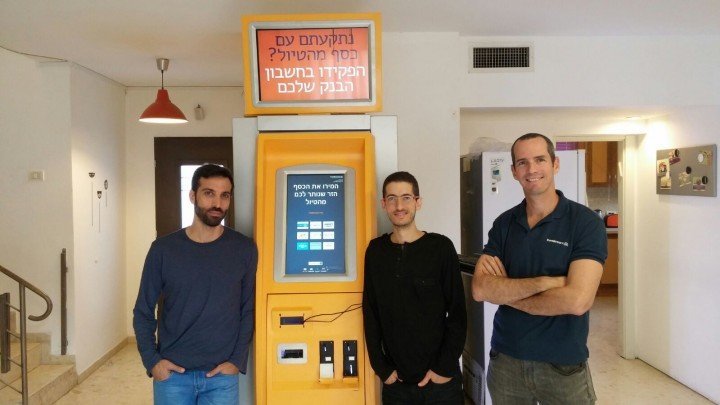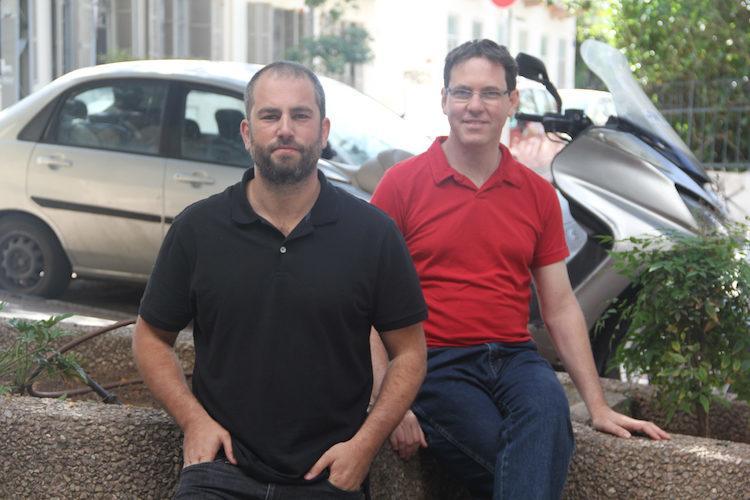
Waterfront view of Tel Aviv. Photo credit: sedmak / 123RF.
The relentless growth engine of the Israeli startup ecosystem showed no signs of slowing down this year. Tel Aviv was ranked as the third hottest startup hub in the world by venture capital firm SparkLabs, just behind Silicon Valley and Stockholm. Startups from the tiny Middle Eastern country nabbed almost US$550 million in VC funding in June alone.
For context, new Israeli companies raised US$3.6 billion in 2015, or an average of US$300 million every month. It’s likely that figures for this year will obliterate that tally.
Because of Israel’s small domestic market, entrepreneurs from the country tend to build companies that address global issues. You’ll find expertise in cybersecurity, drones, IoT, autonomous cars, and consumer tech.
Here are 11 inventive startups that raised funding this year.
1. Houseparty
New social apps face seemingly insurmountable challenges – but Houseparty has stealthily grown to about a million daily active users. The app launched fairly recently but has already sparked a bidding war among VCs, with Sequoia narrowly edging out competing suitors to lead a US$50 million funding round last week.
Houseparty is engineered by the founders of Meerkat – the livestream darling that raised US$14 million before going bust in September. It works as a private livestreaming service, allowing users to jump in and out of video calls shared between a maximum of 8 people.
Sima Sistani, chief operating officer of Houseparty, believes the app could be the new social network for Generation Z and likens it to Snapchat with a focus on shared, authentic experiences.

It’s a whole new way to communicate with friends. Photo credit: Houseparty.
2. Sixgill
Almost all cyberattacks originate from the dark web – that’s the hidden, encrypted part of the internet not accessible by Google. Sixgill prowls the dark web’s social networks to detect and quell threats before they cause major damage.
The startup’s founding team consists of intelligence and cybersecurity experts. Avi Kazstan, CEO of Sixgill, told Tech in Asia in August that criminal activity is rife on the dark web – with people looking to rob banks, attack countries, and hire contract hitmen. Encryption helps them maintain a degree of anonymity and prevent detection from law enforcement.
Sixgill works with large organizations such as financial institutions, government bodies, and intelligence agencies. It raised US$5 million in June.
3. Travelersbox
Travelersbox builds ATM-like kiosks which allow people to make use of the pesky foreign currency left behind after a holiday or business trip.
Instead of wasting the cash on buying things you don’t need at the airport, users can redeem it for useful stuff like Nike gift cards, Skype call credit, Paypal, charitable donations, or direct bank transfers.
The startup fattened up with additional funding of US$10 million in January. It also tied up a partnership with Baidu and plans on unlocking several new Asian markets in the near future.

Photo credit: Travelersbox.
4. Nexar
It sucks when some douchebag cuts you off on the road or hits your car from behind. And there’s little you can do to prove your innocence. Nexar wants to encourage better driving, with the ultimate goal of eliminating car crashes entirely.
It’s developed an AI dashcam app that records everything from the minute you start driving. Nexar’s app will constantly monitor traffic conditions and communicate with other devices nearby to provide real-time alerts about potential dangers ahead.
Future plans of the company involve participation in the autonomous vehicle revolution, as well as using data for better insurance products and road safety procedures. It raised a US$10.5 million series A round in June.
5. Zebra Medical Vision
As global appetite for health care services reaches the stratosphere, computers will have to step in to augment human capabilities. Zebra Medical Vision addresses this problem by deploying machine learning to scan and diagnose medical imaging data.
The startup is backed by powerhouse investors such as Salesforce CEO Marc Benioff and Khosla Ventures. In October, it said that it’s successfully developed an algorithm to improve breast cancer detection – based on analysis of thousands of mammograms.
Zebra’s technology also helps patients with cardiovascular disease by allowing doctors to identify high-risk patients and detecting problems far more efficiently.
A significant update last month meant that users across the world could receive accurate advice by uploading CT scans and mammograms.
The startup raised US$12 million in June.
6. Lemonade
Buying insurance for your home is a painful chore, with shady middlemen, recurring payments, and cumbersome claim processes adding to the abhorrent experience. Frankly, we’d rather skip it entirely if we could.
Lemonade feels your pain. The startup’s making it far easier and cheaper to insure your home and personal possessions by cutting out middlemen entirely and selling plans via an app.
Its business model is also markedly different than that of other insurance companies. Lemonade keeps a flat 20 percent of the premium users pay – as opposed to the traditional model where companies earn more the more claims they reject. The remainder is set aside and put in a big pool to handle ensuing claims.
Lemonade says the model helps curtail costs and passes those on to its users. It advertises plans for homeowners starting as low as US$35/month. For renters, it costs US$5/month.
There’s a humanitarian element built in too. If, at the end of the year, there’s excess cash in the pool, the startup will donate it to a charity of choice.
Lemonade raised a US$34 million series B round last week.
7. Prospera
Prospera wants to help farmers improve crop yields by analyzing plant health and identifying diseases at an early stage.
Prospera CEO and co-founder Daniel Koppel told TechCrunch that the problem farmers face is not a lack of hi-tech – they have drones, sensors, and other tools – but reliable analytics that analyze all these data points and put them all together.
The startup uses sensors, cameras, and machine learning to assist farmers in ensuring healthy crops, both inside greenhouses and in the field. It counts Walmart, Tesco, and Sainsburys as clients.
Prospera raised US$7 million in July.
8. Twiggle
Twiggle is using AI to build better ecommerce search technology. It’s already impressed Jack Ma – Alibaba poured in an undisclosed amount in May on top of an earlier US$12.5 million series A round led by Naspers.
The startup is building natural language search systems, which means it’s easier for users to use queries like “I want a two-door fridge that doesn’t make too much noise which is also white, which is new, has great reviews, and is a good value for money.”
Such a product could work wonders on Alibaba’s Taobao and Tmall marketplaces, where the sheer enormity of results is overwhelming for most, but the Chinese leviathan hasn’t said whether it’ll be deploying the tech.
Twiggle says the algorithm is best suited for mobile, voice-based search, and conversational interfaces. It’s headed by former Google execs.

Twiggle’s Amir Konigsberg (left) and Adi Avidor (right). Photo credit: Twiggle.
9. Otonomo
The era of the internet-connected car is well and truly upon us. This might take shape in the form of self-driving vehicles, or just a lot of apps in our cars to make driving a better experience, but there’s no doubt about the demand for car connectivity solutions.
Otonomo’s building a marketplace that’ll help both manufacturers and developers of car apps. Think of it as a Stripe for connected cars. The startup’s also aggregating data from hundreds of manufacturers across the globe to understand driver behavior, and assist sectors like insurance and urban planning.
It raised US$12 million in November.
10. Airobotics
Airobotics is taking humans out of the drone equation entirely. It builds autonomous industrial drones, designed for tasks like factory safety checks and surveying and mapping.
The drones are programmed for self deployment and landing, and can be instructed not to veer outside a specific perimeter. It raised US$28.5 million in June.
11. Gett
The likes of Uber, Grab, and Didi might be armed with war chests filled with billions of dollars, but an upstart from Israel feels it can compete.
Gett joined the unicorn club this year after it hooked US$300 million from Volkswagen in May. In November it pocketed a further US$100 million, with Shahar Weiser, Gett’s CEO, claiming it’s beating Uber in Europe.
The ride-hailing app started in Tel Aviv but is now present in over 100 cities globally, including those in the US, UK, and Russia. It’s different from Uber in that it doesn’t impose surge pricing and only offers taxis, not private vehicles.
It also positions itself more as a corporate transportation service than a service for individual customers.
This post 11 unique startups from Israel that raised funding in 2016 appeared first on Tech in Asia.
from Tech in Asia https://www.techinasia.com/israel-funding-2016
via IFTTT

No comments:
Post a Comment